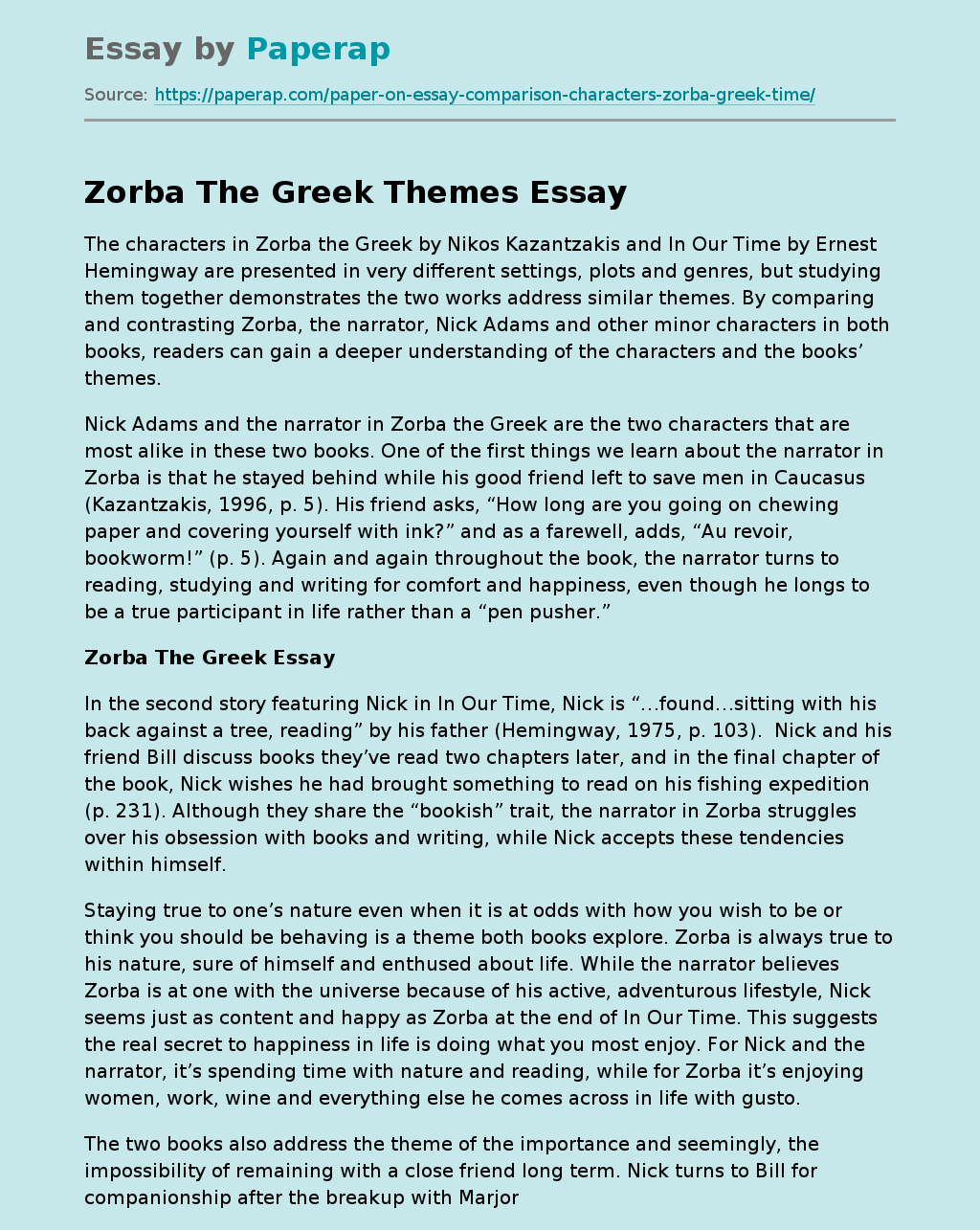Zorba The Greek Themes
The characters in Zorba the Greek by Nikos Kazantzakis and In Our Time by Ernest Hemingway are presented in very different settings, plots and genres, but studying them together demonstrates the two works address similar themes. By comparing and contrasting Zorba, the narrator, Nick Adams and other minor characters in both books, readers can gain a deeper understanding of the characters and the books’ themes.
Nick Adams and the narrator in Zorba the Greek are the two characters that are most alike in these two books.
One of the first things we learn about the narrator in Zorba is that he stayed behind while his good friend left to save men in Caucasus (Kazantzakis, 1996, p. 5). His friend asks, “How long are you going on chewing paper and covering yourself with ink?” and as a farewell, adds, “Au revoir, bookworm!” (p. 5). Again and again throughout the book, the narrator turns to reading, studying and writing for comfort and happiness, even though he longs to be a true participant in life rather than a “pen pusher.
”
Zorba The Greek Essay
In the second story featuring Nick in In Our Time, Nick is “…found…sitting with his back against a tree, reading” by his father (Hemingway, 1975, p. 103). Nick and his friend Bill discuss books they’ve read two chapters later, and in the final chapter of the book, Nick wishes he had brought something to read on his fishing expedition (p. 231). Although they share the “bookish” trait, the narrator in Zorba struggles over his obsession with books and writing, while Nick accepts these tendencies within himself.
Staying true to one’s nature even when it is at odds with how you wish to be or think you should be behaving is a theme both books explore. Zorba is always true to his nature, sure of himself and enthused about life. While the narrator believes Zorba is at one with the universe because of his active, adventurous lifestyle, Nick seems just as content and happy as Zorba at the end of In Our Time. This suggests the real secret to happiness in life is doing what you most enjoy. For Nick and the narrator, it’s spending time with nature and reading, while for Zorba it’s enjoying women, work, wine and everything else he comes across in life with gusto.
The two books also address the theme of the importance and seemingly, the impossibility of remaining with a close friend long term. Nick turns to Bill for companionship after the breakup with Marjorie (Hemingway, p. 122), and he enjoys the company of George on a skiing trip later on in the novel (p. 188). Similarly, both the narrator and Zorba realize they’re happiest in each other’s company. Zorba says to the narrator, “…when we’re alone together and nobody can see us, we can laugh and enjoy ourselves!” (Kazantzakis, p. 71). The two didn’t go to Crete for any other real reason. When the Negro describes his relationship with Ad to Nick in In Our Time, he sounds as if he could be speaking of Zorba and the narrator in Zorba the Greek: “I like to be with him and I like seeing the country and I don’t have to commit no larceny to do it. I like living like a gentleman” (Hemingway, p. 137).
Friendships and happiness are split apart by the characters themselves in the two books again and again. At the start of Zorba the Greek, the narrator details how he let his friend leave him behind. Later, he will leave Zorba behind in search of that original friend, but in vain, as the friend has died. Nick tells George, “There isn’t any good in promising” they’ll go skiing again (Hemingway, p. 188).
Other characters share similarities that relate to other themes both books share. Zorba and Bill in In Our Time share similar views on marriage and women. They both believe it’s the “great folly,” and marriages fail or fall apart again and again throughout both books. The monk Joseph, Zorba and Krebs all seem to have a sort of demon within them that makes them “mad.” Even though their demons are different, the power they exert over each man is impossible to control.
These are some of the many similarities and differences among the characters in Zorba the Greek and In Our Time. Studying the two books’ major and minor characters in comparison with one another illuminates themes both books share, and makes it possible to understand the characters in greater depth.
Zorba The Greek Themes. (2019, Dec 05). Retrieved from https://paperap.com/paper-on-essay-comparison-characters-zorba-greek-time/

